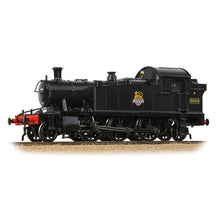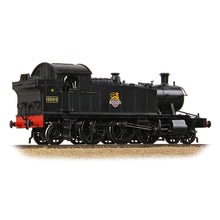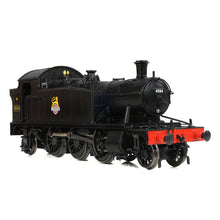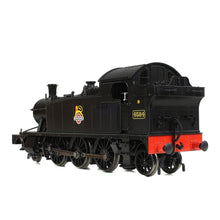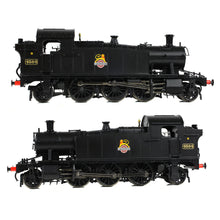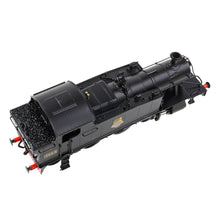
GWR 4575 Prairie Tank 4584 BR Black (Early Emblem)
32-137B
Bachmann
Branchline
Era - Era 4
Running Number - 4584
Additional Info 1 - 83E Shedcode
Additional Info 2 - N/A
Accessories - No
Motor Type - 3 Pole
DCC - 8 Pin Socket
Speaker? - No
DCC Fans - N/A
Tinted Windscreen Glazing? - N/A
Auto-Release Couplings? - No
Bach-Up Stay Alive? - No
Firebox Lighting - No
Directional Lighting - N/A
Cab Lighting - N/A
Interior Lighting - N/A
Weathered - No
Preserved - No
Passengers Fitted? - N/A
Supplied with Load - N/A
Supplied with Etched Plates? - N/A
Length (over couplings) - 151mm
NEM Couplings - Yes
Sprung Buffers - Yes
Tender Pickups - N/A
Adjustable Tender Drawbar - N/A
-
-
The 4575 Prairie Tanks ; were some of the GWR most versatile locomotives and this Bachmann Branchline model brings the same versatility to any OO Scale layout set in the Western Region.
The charm of the prototype is captured in the Branchline model which features a highly detailed, precision moulded bodyshell that is adorned with a multitude of separate components, from the metal handrails and tank vents to the lamp irons, tank fillers, lubricators and whistle. Sprung metal buffers are carried on each bufferbeam and inside the small but perfectly formed bunker, a realistic coal load is fitted.
The chassis, powered by a substantial 3 pole motor, carries an 8 pin DCC decoder socket and is adorned with details like the springs, brake blocks, brake rigging and sand boxes accompanied by separate wire sandpipes. Each of the front and rear pony trucks is sprung to provide superb track holding and NEM coupling pockets are moulded integrally; guard irons are also incorporated giving the trucks an authentic appearance. The livery is applied to the usual high standard you would expect from a Bachmann model, with rich paintwork adorned with finely printed lettering and numbering to produce a model that is fit for service straight out of the box.
MODEL FEATURES:
CLASS 4575 HISTORY
Under the tenure of George J. Churchward, the Great Western Railway (GWR) 45XX Class Small Prairie Tank Locomotives were built, with construction beginning in 1906 and by 1915, four batches totalling 55 locomotives had been completed. Following Grouping in 1923, Charles Collett ordered the construction of twenty more, before modifying the design to produce the 4575 Class. The two types were essentially the same, but with the 4575s boasting a higher water carrying capacity, facilitated by larger side tanks which made it easy to tell the two types apart the 4575s having slope sided tank tops whereas the 45XX tanks had straight tops. One hundred 4575s emerged from Swindon Works between 1927 and 1929 and like their sister locomotives, they were put to work on mixed traffic duties, predominantly on branch lines.
The entire fleet was inherited by British Railways upon Nationalisation in 1948, but eight years later withdrawals being, the closure of branch lines and the introduction of diesel multiple units signalling their demise. By 1964 the entire Class had gone, but the Class is strongly represented today as eleven examples survived the cutters torch and are now preserved at various sites across the UK.
Expected delivery Winter 2024 subject to availability
32-137B
Bachmann
Branchline
Era - Era 4
Running Number - 4584
Additional Info 1 - 83E Shedcode
Additional Info 2 - N/A
Accessories - No
Motor Type - 3 Pole
DCC - 8 Pin Socket
Speaker? - No
DCC Fans - N/A
Tinted Windscreen Glazing? - N/A
Auto-Release Couplings? - No
Bach-Up Stay Alive? - No
Firebox Lighting - No
Directional Lighting - N/A
Cab Lighting - N/A
Interior Lighting - N/A
Weathered - No
Preserved - No
Passengers Fitted? - N/A
Supplied with Load - N/A
Supplied with Etched Plates? - N/A
Length (over couplings) - 151mm
NEM Couplings - Yes
Sprung Buffers - Yes
Tender Pickups - N/A
Adjustable Tender Drawbar - N/A
-
-
The 4575 Prairie Tanks ; were some of the GWR most versatile locomotives and this Bachmann Branchline model brings the same versatility to any OO Scale layout set in the Western Region.
The charm of the prototype is captured in the Branchline model which features a highly detailed, precision moulded bodyshell that is adorned with a multitude of separate components, from the metal handrails and tank vents to the lamp irons, tank fillers, lubricators and whistle. Sprung metal buffers are carried on each bufferbeam and inside the small but perfectly formed bunker, a realistic coal load is fitted.
The chassis, powered by a substantial 3 pole motor, carries an 8 pin DCC decoder socket and is adorned with details like the springs, brake blocks, brake rigging and sand boxes accompanied by separate wire sandpipes. Each of the front and rear pony trucks is sprung to provide superb track holding and NEM coupling pockets are moulded integrally; guard irons are also incorporated giving the trucks an authentic appearance. The livery is applied to the usual high standard you would expect from a Bachmann model, with rich paintwork adorned with finely printed lettering and numbering to produce a model that is fit for service straight out of the box.
MODEL FEATURES:
- Bachmann Branchline OO Scale
- Era 4
- Pristine BR Black Early Emblem livery
- Running No. 4584
- Short Safety Valve Cover
- NEM Coupling Pockets
- Sprung Buffers
- Powerful 3 Pole Motor
- Equipped with a 8 Pin DCC Decoder Socket Recommend Decoder item No. 36-566A
- Length 151mm (over couplings)
CLASS 4575 HISTORY
Under the tenure of George J. Churchward, the Great Western Railway (GWR) 45XX Class Small Prairie Tank Locomotives were built, with construction beginning in 1906 and by 1915, four batches totalling 55 locomotives had been completed. Following Grouping in 1923, Charles Collett ordered the construction of twenty more, before modifying the design to produce the 4575 Class. The two types were essentially the same, but with the 4575s boasting a higher water carrying capacity, facilitated by larger side tanks which made it easy to tell the two types apart the 4575s having slope sided tank tops whereas the 45XX tanks had straight tops. One hundred 4575s emerged from Swindon Works between 1927 and 1929 and like their sister locomotives, they were put to work on mixed traffic duties, predominantly on branch lines.
The entire fleet was inherited by British Railways upon Nationalisation in 1948, but eight years later withdrawals being, the closure of branch lines and the introduction of diesel multiple units signalling their demise. By 1964 the entire Class had gone, but the Class is strongly represented today as eleven examples survived the cutters torch and are now preserved at various sites across the UK.
Expected delivery Winter 2024 subject to availability






